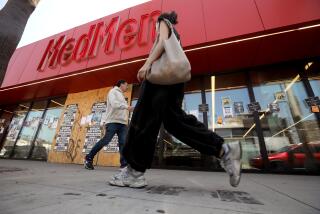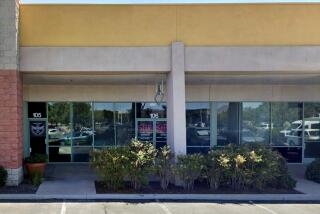Herbalife is rocked by new crisis
This was the last thing Herbalife Ltd. needed.
Just as the Los Angeles company appeared to be regaining its footing from a Wall Street hedge fund manager’s assault, the company’s auditor resigned abruptly because of an alleged insider-trading scandal.
Accounting giant KPMG said Tuesday that Scott London, its chief Southern California auditor, had divulged financial information about Herbalife to a friend who then used those secrets to gain an edge in the markets. KPMG fired London, who had supervised Herbalife’s audits, and withdrew its approval of the company’s financial statements.
The accounting firm said there’s no evidence that London doctored Herbalife’s books. Still, KPMG’s unexpected moves are causing publicly traded Herbalife new pain.
Full coverage: KPMG auditor accused of insider trading
Without audited financials, the nutritional products company could be in violation of New York Stock Exchange rules, putting it at risk of having its stock removed from the exchange. On top of that, investors already skittish about Herbalife’s business model have a new concern: There is now no independent auditor vouching for the accuracy of its statements about sales and profits.
Herbalife shares fell $1.44, or 3.75% on Tuesday, closing at $36.95.
Company officials scrambled Tuesday to reassure investors that its financial statements are accurate and that the company’s stock will continue to trade as normal.
“We believe we are currently in compliance with the New York Stock Exchange listing requirements and we do not anticipate that the NYSE will initiate any type of proceeding to delist the company,” Herbalife said in a statement.
Still, even fans of the company said Tuesday’s events could prove disruptive for Herbalife.
Tim Ramey, an analyst with D.A. Davidson & Co. in Oregon who has long been bullish on Herbalife, downgraded the company’s shares Tuesday to neutral from a buy recommendation. He also reduced his one-year price target for the stock to $38 a share from $78.
Although it’s unlikely that the NYSE would delist Herbalife, Ramey said it could take a year for the nutritional supplements maker to hire a new independent auditor and have its financial statements approved. That in turn could damage its borrowing ability, he said.
“There is no reason to feel differently about Herbalife, its prospects, its historic performance or our outlook,” he said in a research report. “Yet as a stock, it will be a serious problem to be out of compliance — through no fault of their own — with NYSE requirements and potentially breach their loan covenants.”
Herbalife’s stock price has been on a wild ride since December, when billionaire hedge-fund manager Bill Ackman argued in a Wall Street presentation that the company is a pyramid scheme because it pays its independent distributors more money for recruiting than for selling its diet shakes, nutrition bars and supplements. Ackman bet
$1 billion that Herbalife shares would fall.
The company denied those allegations, arguing that its business model is legal and profitable. It pays distributors commissions from their own sales, as well as those they recruit into the business. The company reported record sales in 2012 — and won a key supporter: investor Carl Icahn, who now owns more than 15% of the company’s shares.
Herbalife isn’t the only Southern California company reeling from KPMG auditor London’s alleged betrayal. He is also accused of providing inside information about Skechers USA Inc. to the same friend.
The Manhattan Beach footwear maker was stunned by the news, company officials said Tuesday.
Skechers was set to announce its first-quarter earnings results this month. Now, finance and operating chief David Weinberg fears the company “may have to ask for some sort of extension.”
“The game plan is to find new auditors as quickly as possible,” he said. “We’re obviously under some significant time restraints.”
Weinberg said Skechers learned of London’s alleged misconduct Monday. He said KPMG sent two partners to the shoe firm’s offices, where they read a prepared statement and left without answering many questions.
KPMG had been Skechers’ auditor since it launched in 1992, Weinberg said. London had worked on the account off and on for about eight years total.
“We had no idea what was going on,” Weinberg said. “We’re still not sure what went on.”
Skechers shares gained 40 cents, or 1.9%, closing at $21.91.
Skechers isn’t new to controversy.
Last year, it agreed to pay $50 million to settle false-advertising allegations by the Federal Trade Commission and the attorneys general of 44 states and the District of Columbia. At issue: Skechers’ Shape-Ups and other toning shoes that, according to critics, failed to live up to weight-loss promises.
Now, amid the fallout from KPMG, the company has to have two years of financial statements re-audited. But Weinberg said that there is no reason “to believe that there’s anything in those numbers that’s not 100% true.”








